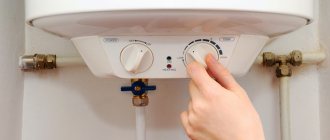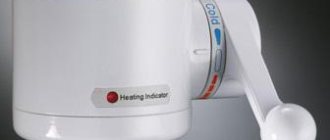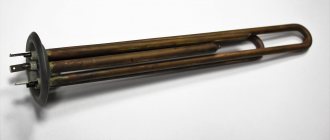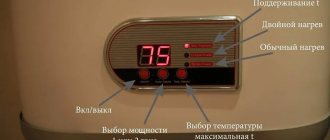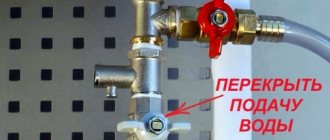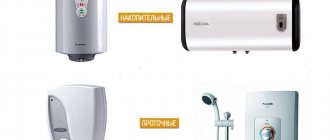Almost every house or apartment, along with household appliances such as a TV, vacuum cleaner, microwave oven, refrigerator, etc., has a water heater. There are 4 types of these units:
- liquid;
- gas;
- solid fuel;
- electric.
This division is based on what type of fuel is used to operate the water heater.
There are many reasons that force residents of city houses to install electric boilers in their apartments. The main ones are constant shutdowns of hot water or its heating, but of poor quality. So-called storage tanks are in particular demand. They work according to the following principle: a special tank is installed on the wall, in which water accumulates, and then it is heated for a certain time.
One of the advantages of this type of water heater is its low electricity consumption. In addition, it can be installed very easily without the help of a specialist. But to do this, you first need to familiarize yourself with the features of its operation and installation instructions. In this case, you need to be very careful. After all, if the technology is disrupted, the consequences could be dire. The most terrible of them are the explosion of the boiler and the breakdown of the communication connection.
How does a water heater work?
A boiler explosion is not a common occurrence, but it is quite possible. In order to understand why this can happen and what needs to be done to prevent it from happening, you must first understand the structural features of this unit.
The heating element is of great importance for a water heater. These small tubular elements do a huge job - they turn cold water into heated water to the temperature that the user has set. And therefore, in order for your boiler to work without interruptions, you need to monitor its serviceability. And if this element breaks, you can easily replace it with a new one. You can buy heating elements from us. As a rule, a magnesium anode is purchased along with the heating element; it requires annual replacement.
Any domestic water heater is designed with two shut-off valves. One of them is installed at the cold water inlet, and the other at the hot water outlet.
Another important component for any boiler is a thermostat, thanks to which the unit will not heat up above the temperature set by the user.
In addition, it also contributes to economical energy consumption. Thus, the thermostat for the water heater plays a very important role.
At the inlet of the cold water flow, the design provides two valves: a non-return valve and a safety valve. The first is responsible for preventing water from flowing from the tank back into the cold water supply system. And the second, in case of pressure above normal (if it exceeds 6 atm), will drain water from the system through a special hole.
But don’t be alarmed if your boiler suddenly starts bleeding water. After all, this does not mean that it has broken down or that some other unforeseen situation has occurred. Excess water can also be drained during the heating of the household appliance, since it expands when the temperature rises. So, if the water temperature has reached 90 °C, then the volume of liquid should increase by about 3%. It turns out that in a 100 liter tank after heating there will be 103 liters of liquid. And this “extra” water needs to go somewhere.
Today, high-quality water heaters have a special space for such “excess”, thanks to which water does not leak out of the system. But if it turns out to be not enough, then the liquid begins to flow through the safety valve in operating mode, and not in emergency mode. To make it more convenient, you can put a drain pipe on this valve, which will direct excess water directly into the drain. Or, as an option, you can place any container below.
In order to be able to adjust the pressure inside the system, there is a reducer at the inlet. Water flow pressure not exceeding 3 atm is considered normal for most water heaters and this is taken into account when designing them. And if this mark is exceeded, the liquid flows out of the unit through a specially built-in drain system.
To prevent the heater from exploding, its design includes the following 2 elements:
- valve to reduce intrasystem pressure (safety);
- thermostat.
But it happens that both one and the other malfunction. And then this leads to various accidents during operation of the water heater. For example, an explosion or a communication gap. Let's say you set the temperature to which the boiler was supposed to heat the water, and then, according to the “command” of the thermostat, it was supposed to turn off. But due to the faulty latter, the unit did not turn off and the water in the tank continued to heat up until it boiled. As a result, the pressure in the system increased greatly. All of this could easily be solved with a safety valve. But, as it turned out, it was also faulty. And “extra” water cannot leave the unit. This situation is very dangerous, since due to a malfunction of these two elements, the water heater will either rupture or the pipe will break.
Instantaneous water heater problems
Since the specifics of the work are different, the reasons for the explosion are slightly different.
Installation problems
Flow-through boilers are divided into two types: closed and open. The latter must be connected to a closed water supply system. They are designed for use at one point (sink or shower). While closed ones are connected to a common riser and provide supply at several points.
Thermal sensor did not work
If it is jammed or stuck, it will not work when it boils, resulting in an explosion. Noticed a problem? Replace the sensor.
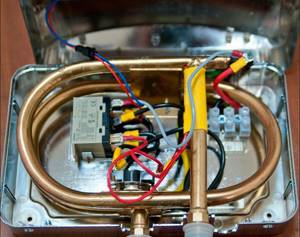
There are other problems:
- When the appliance is equipped with a shower hose, if it is pinched, the flow switch will not operate. The pressure increases sharply, which leads to an accident.
- The heater's thermal protection did not work.
- In some models, you need to press a button to turn it on and off, rather than opening a tap. If the tap is closed and the button is not turned off, the consequences are predictable.
- The switch is broken. The water flow is turned off and the temperature sensor did not work, resulting in overheating.
Explosion warning. What should be done?
By following just a few simple rules, you can avoid situations that lead to a boiler explosion, and also prevent other possible emergency breakdowns of the water heating system. So:
1. It is very important to connect the household unit correctly;
2. Constant monitoring to ensure that the water heater is working correctly (no unnecessary shutdowns, normal operation of heating lamps, etc.).
And further. Each boiler has an individual time during which the water heats up to the maximum value. And as soon as this time is over, the thermostat should turn off via a thermocouple. But if the thermostat is broken, the water heater will not be able to turn off and this will lead to its explosion. In such a case, it is necessary to turn it off immediately.
And under no circumstances should you drain hot water. The high pressure that has built up in the water heating system increases the boiling point. Therefore, draining the water will lead to a decrease in internal pressure; unboiled water will boil, forming a lot of steam, and the unit may explode.
Thus, the only thing that is required of you in such a case is to turn off the boiler so that it cools down and wait for a specialist to arrive.
The boiler blew up: how it happens
Water boils at a temperature of 1000C - a fact familiar from school. A water heater is a large boiler. When the water in the unit overheats, steam is formed. Excess steam expands the walls of the tank. Further - worse. If you're lucky, the pipes will break. At worst, the tank will explode.
This happens when the safety valve or thermostat is broken. The heating element works uncontrollably without stopping and an explosion is inevitable. That's why you can't put off boiler repair if you discover a malfunction of these devices.
Good, and most importantly safe and long-term operation of the unit can only be ensured by its quality
A high-quality boiler differs from a low-quality one by the presence of a pair of thermostats that prevent the possibility of an explosion. The temperature of the first is regulated by the user, and the second is already programmed by the manufacturer at +94 °C. Thus, if the first one is faulty and cannot perform its functions, the second one, as soon as the water heats up to 94°C, will immediately block the system. To remove this lock, you will need to partially disassemble the device.
Use only high-quality boilers. After all, spare parts for water heaters can be from different manufacturers. And your task, when choosing this unit, is to give preference to the one that is assembled from components from trusted companies.
By purchasing a high-quality, expensive emergency pressure relief valve, you don’t have to worry that it won’t work at the right time and the water heater will explode. This boiler element must be constantly checked and replaced approximately every two years. To check the condition of the safety valve, it is necessary to monitor whether it drips while the equipment is heating. If yes, then it is OK.
When installing pipes, both inlet and outlet, use only high-quality metal-plastic pipes. After all, a pipeline made of metal or plastic forms a strong connection with the boiler, which is provided with a thread. And in a situation when the intra-system pressure begins to increase, this connection will not break, but will lead to a rupture of either the water heater itself or the thread. And metal-plastic pipes are connected by fittings that compress the pipe. And, if an emergency occurs, this connection will simply break: the pipe will break out of the boiler, preventing its explosion.
When installing a water heater in a boiler room, do not equip the latter with very durable windows. After all, in the event of an explosion, they will fly out first, thus preserving the walls.
Precautions against boiler explosion
In order to protect yourself and your loved ones from possible injuries, the user should always monitor the operation of the water heater. Elements and components of the boiler that is being monitored:
- Heating light alarm, during the heat transfer process, they control whether the LEDs are lit or not, as well as the time the thermocouple is turned on and the thermostat is turned off.
- If the thermostat fails, the power supply to the device is turned off. Wait for the device to cool down naturally. It is forbidden to open taps on an overheated device, as you may get scalded by the steam.
- Monitor the operation of the safety valve; when the boiler heats up, it should drip a little.
- It is better to piping the boiler with polyethylene pipes. In case of overheating, they will take on the load and the storage tank will not be deformed.
In the room where the water heater is located, it is recommended to install plastic windows, which in the event of an explosion will take on the entire load, and the walls will be preserved.
In the practice of preparing hot water through water heaters, a tank explosion is an isolated incident. It can be avoided; you only need to strictly follow the installation and operation rules prescribed by the manufacturer.
What other problems might arise?
Fixing the consequences of a burst water pipe will cost you much less than the consequences of an explosion of the boiler itself.
But if you try, such situations may not arise. Failure of the pipeline will lead to the flow of water, the amount of which will increase all the time. Next, hot water will begin to flow out of the water heater. Repairing the unit and finding out the reasons for water overheating can only begin after the tank of the device is completely empty and the room is well ventilated. But if the pipes have a reliable and high-quality connection to the boiler, then they may not break. Instead, due to the growing intra-system pressure, the heater itself will explode, bringing with it the following devastating consequences:
- a household appliance can no longer be repaired after an explosion;
- everything around, including doors, furniture, walls, tiles, water and gas communications, etc., can be damaged to the point where repairs will no longer help.
It is very important not to forget that it is much easier to prevent an explosion than to eliminate its consequences later. And to do this, control the operation of your household appliances. And do not forget about regular maintenance and timely repair of the water heater. We provide service and repair of Ariston, Termex, Timberg, Garanterm and other brands.
Emergency situations in the operation of water heaters
Breakdown of communication pipes
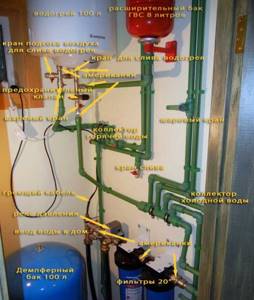
Diagram of connecting the water heater to communication pipes.
A breakdown of communication pipes causes significantly less damage than a boiler explosion. When pipes break, they may first leak, then the amount of water flowing from the boiler increases and then the pipe suddenly breaks, followed by hot water pouring out of the boiler and water vapor escaping into the room. After emptying the boiler cavity from the hot liquid and ventilating the room, you can repair the communications, also find out the cause of overheating of the water heater fluid and eliminate it.
In the case when the pipes are connected to the water heater very efficiently and reliably, failure may not occur. The accumulating and increasing pressure ruptures the cavity with water, and the water heater explodes. When an explosion occurs, its destructive consequences are wider. The boiler itself is completely destroyed (cannot be repaired or restored). An explosion can also destroy furniture, tiles, doors, rupture of water or gas communications, broken windows and collapse of walls.
How to prevent an emergency
Follow these simple rules:
- Install equipment correctly.
- Monitor the operation of the device. Look at the panel: the indicators will tell you whether heating continues or not. If, after the time has passed, the heating element continues to work, disconnect the boiler from the network. Don't flush the water! This way the pressure will drop sharply, and the boiling will become even more active. Just wait for the master to arrive.
- Check and replace the safety valve in a timely manner.
- Make connections through metal-plastic pipes. They are mounted through fittings, so the connection breaks when there is excess pressure. Whereas plastic or metal pipes have threads. Then the tank is more likely to explode.
The most important thing is to buy high-quality equipment for your apartment. Its manufacturer provides the proper protection system, so you don’t have to worry.
READ MORE: The washing machine does not turn on. Service center for repairing washing machines in Moscow Master177.
A visual experiment on a heater explosion:
Did the article help you?
Not really
Thermal protection did not work
https://www.youtube.com/watch?v=_77LiS7L90A
The heating element is equipped with a special button, which serves as protection against overheating. As soon as the indicators exceed the norm, the button is triggered and the heating element is turned off. Due to breakage or low-quality plastic that melts, the protection does not work - the element does not turn off when heated.
The same thing happens as with the temperature sensor: steam inflates the housing and it explodes. Diagnosis and replacement of the element is necessary.
READ MORE: 5 reasons to install a dryer | Other household appliances | Blog | DNS Club
The listed problems are typical for storage boilers.
Since the specifics of the work are different, the reasons for the explosion are slightly different.

